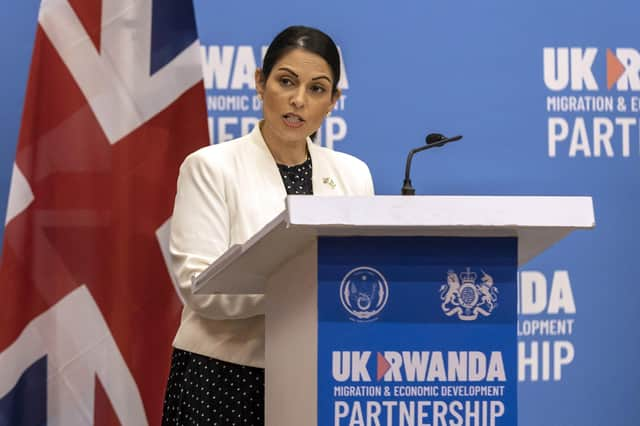Those wanting to open the borders to everyone need to be honest about it - Brian Monteith


What we know about the large rise in illegal arrivals by boat is they are practically all transported by people traffickers, 98 per cent destroy their identification before landing and nearly 90 per cent are men. They do this because they have been told that as soon as they land in the UK it will be almost impossible to deport them.
The UK cannot deport without a destination, there can be no destination without permission and you cannot get permission without ID. Now, under the UK’s new agreement with Rwanda, illegal immigrants will be accepted for deportation there. With the stroke of a pen the traffickers case for selling a seat on the boat to the UK has vanished.
Advertisement
Hide AdAdvertisement
Hide AdThe UN High commission for refugees UNHCR has criticised the Rwanda plan as “unacceptable” – not so well known is how the UNHCR, in conjunction with the African Union and Government of Rwanda, runs its own scheme to take trafficked people from Libya to Rwanda for processing either back to their original countries (if safe) or to settle in Rwanda. Back in 2019 the EU provided 10.3m Euros (partly our money) to finance the scheme.
The UK scheme’s critics regularly pout descriptions stereotyping Rwanda as a home of genocide and corruption, which does have a basis in past truths but does not reflect the current reality. Now Rwanda is the second-best African country to do business in, has the second highest rate of economic growth and is the safest country in the African continent.
And what’ about France, the migrants point of departure? It is in the EU after all, why come to Brexit Britain? It’s an advanced, beautiful and relatively prosperous country that the many Francophone migrants from North Africa should be at ease with.
Yet since 2017 – for fully five years and counting – the European Union, the sacred cow of freedom of movement, has been paying billions to countries to keep their migrants away from illegal entry. Turkey has received billions to stop entry around Greece; Libya has had its coastguard strengthened and trained with new reception centres to try and prevent crossings to Malta, Italy and Spain; while Niger – and Rwanda – have had millions of Euros to take people trying to gain entry to the EU.
Likewise, Scandinavia’s liberal poster-child, Denmark, decided last year to use Rwanda for its own similar scheme – introduced by a left-leaning Social Democrat government.
It doesn’t look like the UK is the inhumane outlier being portrayed by the usual suspects.
The British public do not appear to think the new policy quite as objectionable as those outraged by it are suggesting. Polling by Santa Com Res shows “strongly support” at 25.4 per cent and “somewhat support” at 21.6 per cent, totalling 47 per cent – while those who “strongly oppose” at 14.6 per cent and “somewhat oppose” at 11.1 per cent, totalling 25.7 per cent.
That 47 per cent preferring to back Priti Patel against 26 per cent preferring to oppose her is a significant gap, nearly two to one. To achieve such numbers you need cross-over appeal and right enough the polling reveals amongst Labour voters there is 39 per cent support compared to 36 per cent opposition. These are the sort of policies that brought the Red Wall tumbling down.
Advertisement
Hide AdAdvertisement
Hide AdWhen it comes to whether it is important or not to distinguish refugees or asylum seekers from economic migrants, those in the “important” side of the divide total 81.8 per cent against only 12.4 per cent who think it “unimportant”. Yet from my social media timelines that smaller group dominates Twitter, giving those who rely on it as a barometer – such as many in the media – a completely skewed take on what Britain thinks.
That 12.4 per cent represents both those supporting fully closed or open borders because they share a view that reasons for entering the UK are irrelevant. They are the two extremes in a common fight against the centrist position of managed access.
There are essentially three positions any country can take regarding immigration. Open doors, managed entry and closed doors. The UK, under all governments of all political ideologies has traditionally worked to take the middle path, the centrist position of managed access.
Occasionally this middle course causes a significant degree of opposition because it is judged to have moved too close to open borders, most notably when membership of the expanding EU in the early 2000s resulted in anyone from what was then 370m people having the right to look for work here (it’s now 447m).
The truth is the extreme outliers are those wanting to shut tight or fully open all doors to immigration. The humane course is to manage immigration so help is given to special cases such as refugees, certain dependents of British citizens and those required to fill skill gaps in business and public services.
Removing the centrist managed option leaves a binary choice between fully open or tightly closed doors. The former will destroy our welfare state and the latter cannot sustain a creative vibrant economy. I stand with the moderate centrists on the side of the legal immigrants.
Brian Monteith is a former member of the Scottish and European Parliaments and is editor of ThinkScotland.org
Comments
Want to join the conversation? Please or to comment on this article.
